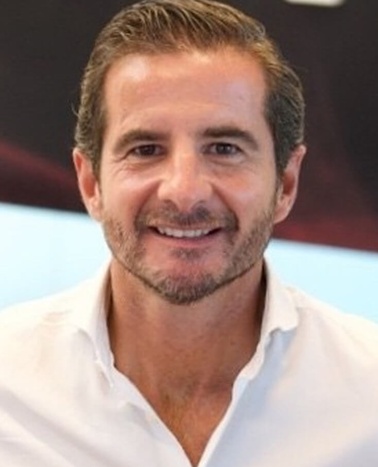
Manuel Álvarez de la Gala
I am Manuel, a marketing leader, educator, and innovator with a relentless drive for learning and transformation. My journey has been shaped by a deep curiosity and an unwavering commitment to adapting in a world that is constantly evolving. Curiosity is the driving force of my life—I am either studying or teaching. It keeps me young and engaged with the world.
My passion for marketing and technology has allowed me to navigate complex challenges, building strategies that not only drive business success but also create meaningful impact. My career has been defined by an eagerness to explore, a belief in lifelong learning, and a desire to empower those around me. For me, the purpose of life is to find your purpose.
Today, I lead with a philosophy rooted in authenticity, adaptability, and resilience. I want to generate a positive impact, not just within my team, but in the world beyond. Whether through marketing innovation, mentorship, or education, my goal is to inspire others to embrace change, take risks, and cultivate a mindset of continuous growth.

"The world is not what you see—it is what you are."
What is the most critical skill that professionals should have in this age of AI?
I would highlight two key qualities: flexibility and curiosity. We must adapt rapidly to the ever-changing environment, and we should embrace lifelong learning. I constantly remind myself that I need to keep learning all the time.
Curiosity is the driving force of my life—I am either studying or teaching. It keeps me young and engaged with the world. We should approach AI and technological advancements not with fear or blind enthusiasm, but with curiosity, always asking: "What’s next? How does this work?" Combined with an open mind and adaptability, these skills are critical to success today.
How can marketing professionals ensure they are making a positive impact?
We are living in an era where technology allows us to create an impact at scale. Today, marketing professionals must align their personal purpose with their company’s vision and mission. When your individual purpose and company objectives are in harmony, it becomes much easier to understand the impact of your work.
The real mission is not just about selling products; it's about transforming the present to create a better future. This is what I encourage my team to do—understand their role beyond campaigns and KPIs, and recognize their influence on shaping consumer perceptions and behaviors in meaningful ways.
How do you balance long-term planning with the need to stay agile?
Long-term planning today is about having a clear vision rather than a fixed, detailed roadmap. When I was studying in the U.S., a professor explained the concept of navigating with "thumb in, thumb out." "Thumb out" represents the vision—where you want to go. "Thumb in" is about adaptability—the small, flexible adjustments you make along the way.
I operate on six-month cycles, constantly re-evaluating and adjusting based on new information. Agility is not just an operational necessity; it’s a mindset. We have to be disciplined in our vision while being flexible in our execution.
How do you make high-stakes decisions when adopting new technologies or launching uncertain campaigns?
This happens every day. I embrace the concept that "FAIL" stands for "First Attempt In Learning." When you redefine failure as a learning opportunity, you approach decision-making differently.
With my team, I allocate 10% of our budget to experimentation. Some technologies will succeed and become business as usual; others will not. We have to be comfortable with that. Risk is inherent in innovation, and the key is to fail fast, learn, and move forward.
What happens when a new technology turns out to be a bad fit?
It happens all the time. At Telefónica, my team tests new technologies constantly. Out of every ten technologies we evaluate, only one might become part of our business operations. The other nine? We discontinued.
However, testing and discarding technologies is an essential part of staying ahead. If you want to be a leader in your field, you must be willing to explore new opportunities—even knowing that many will not work out.
How do you handle situations where a client's vision differs from what you believe is best for them?
Challenging the status quo is part of my role. My clients expect me to push boundaries and introduce new perspectives—even if it means facing internal resistance within their organizations.
Sometimes, the right path comes with risk. Not every idea will be well received, but it is our responsibility to bring innovative solutions forward. The world is evolving faster than ever. I remind my clients that the next ten years will see more technological evolution than the entire past century. If we want to stay relevant, we must embrace change.
What role does data play in your decision-making, and how do you balance data insights with intuition?
Marketing has always been closely tied to creativity and intuition. Today, we operate in a data-driven marketing era, but intuition still plays a critical role.
With my team, I use an 80/20 rule—80% of decisions should be based on data, and 20% on intuition and experience. AI and data provide valuable insights, but human interpretation is what turns insights into meaningful action. AI can generate content and strategies, but it lacks human empathy and vision. That’s where experience and intuition come in.
How important is finding purpose and generating impact outside of work?
From my perspective, purpose is not something that exists inside or outside of work—it should be a constant. The purpose of life is to find your purpose.
For me, that purpose is to love, help, and enjoy. That’s why I dedicate my weekends to teaching and mentoring. My passion for education and knowledge-sharing is not separate from my career; it’s an extension of who I am.
Many people struggle to find their purpose, but once they do, it changes everything. Living with purpose makes work more meaningful and life more fulfilling.
What is your measure of success?
Success, for me, is defined by the positive impact I create. My guiding question is: Am I helping? Whether it's supporting my team, my clients, or my students, success is measured by how much value I bring to others.
I want people to walk away from conversations with me feeling inspired, supported, and equipped with new ideas. That is my metric of success—not just business KPIs, but the human impact I leave behind.
What role does networking play in your career, especially within the IE community?
The network I built during my time at IE has been invaluable. Twenty years after completing my MBA, I still collaborate with my classmates. We support each other in business, exchange insights, and celebrate successes together.
At IE, the selection process ensures that students share similar motivations and values, even if they come from diverse backgrounds. This creates a strong community that lasts beyond the program. That’s why I stayed involved as a professor and academic director—because I want to keep contributing to this incredible network.
How can companies attract and retain Gen Z talent?
Flexibility and purpose.
Gen Z professionals prioritize flexibility in their work arrangements and expect companies to offer meaningful purposes beyond profits. If they don’t see how a company contributes positively to society, they won’t stay. Companies must clearly define their impact and give employees the autonomy to work in a way that aligns with their lifestyle.
Is the world becoming a better place for younger generations?
Absolutely. The rapid advancement of technology is creating unparalleled opportunities. Young entrepreneurs today have access to platforms that allow them to reach thousands—even millions—of people instantly. Just look at how social media and AI have democratized information and business creation. The ability to scale impact has never been greater, making this the best time in history for young innovators.
What are the most exciting trends in digital marketing today?
1. Social Media & Influencer Marketing – Social media continues to grow as a dominant force in marketing. Platforms like TikTok are not just entertainment—they are the new mainstream media.
2. Retail Media – The third major digital revolution, after search (Google) and social media (Facebook). Companies like Amazon are leveraging customer purchase data to create highly targeted advertising opportunities.
3. AI & Search Evolution – AI-powered search, like Perplexity AI, is revolutionizing how consumers find information. Traditional search models are evolving, and brands must adapt quickly.
AI, privacy-focused advertising, and the future of search are transforming marketing at an unprecedented pace. It’s an exciting time to be in this field!
If you could put a message on a billboard for the world to see, what would it say?
"The world is not what you see—it is what you are."
When people internalize this idea, their entire perspective shifts. Everything starts from within. The way we perceive and interact with the world is shaped by our own mindset, and that mindset influences the impact we create.